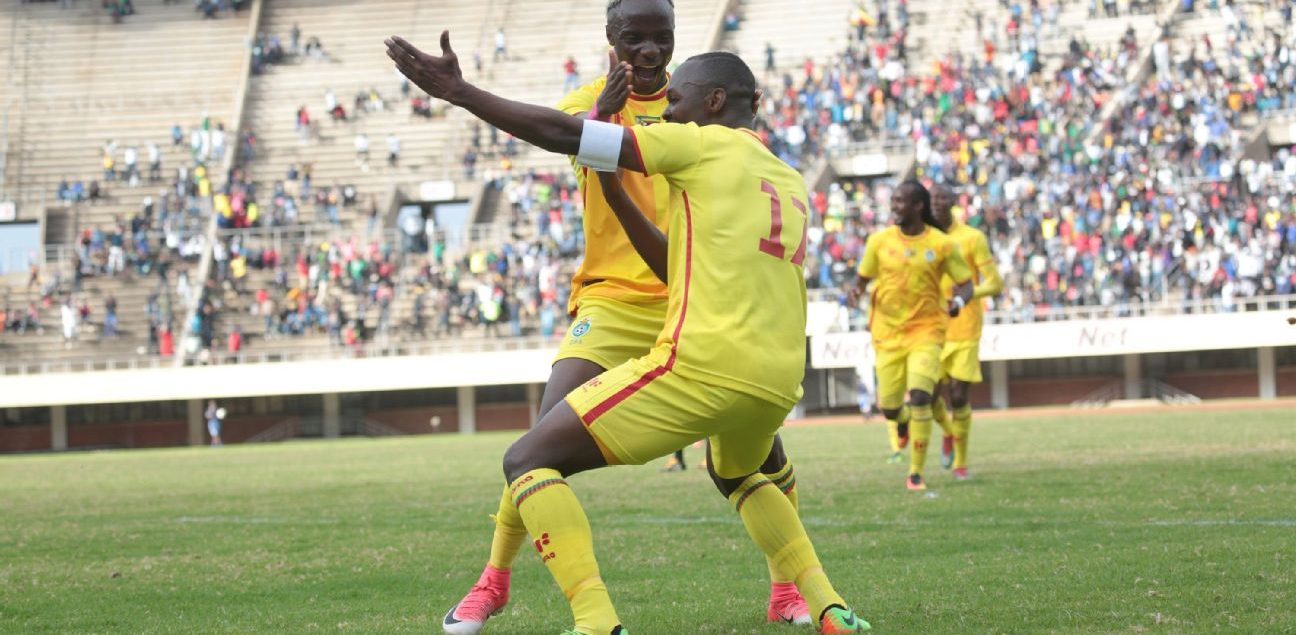Of gloom and glory: Zimbabwe’s AFCON qualification a positive twist to a common narrative
The great Greek tragedian Aeschylus must have had Zimbabwe on his mind when he said, “There is no pain so great as the memory of joy in present grief.”
His words ring true for a nation that has had its fair share of grievances and nationwide disappointment, an overwhelming 39 years that has left the population with unanswered questions and a sense of vulnerability.
But as Khama Billiat curled a wonderful free-kick into the bottom right-hand corner of the goal after 20 minutes, the crowd broke into uncontrolled delirium. There was the joy in present grief and for once, this was a moment they could be happy about – forget about what you read about the country in the newspapers or online.
And at a boisterous National Sports Stadium in sunny Harare, Zimbabwe secured qualification to the African Cup of Nations (AFCON) with a deserved 2-0 win at a time when the nation has had more to cry about than smile.
Yet that worrying feeling will be there, lingering like the cooling mist that greets you on a winter’s morning. The last few days have left the country in deep pain and suffering with much to think about. Recently, Cyclone Idai visited the landlocked country in the Chimanimani and Chipinge areas in the Manicaland province. The natural disaster was predicted days in advance, but many were unable to evacuate.
Scores of people have been gravely affected, with the brunt of the cyclone felt in Mozambique – 1.7 million to be exact, according to reports. That’s why this game was vital for all – to bring a nation in mourning together when the weight of grief is heavy. Zimbabwe is a religious nation, encouraged to pray, to seek peace and understanding from God – only He has the answers to why the cyclone and parts of southern Africa crossed paths.
But the match had to go on with everything you’d expect, in no glowing terms, from African football – dubious officiating, questionable stoppages of play for injuries and a pitch that could have been mistaken for one that you would see in casual Sunday League games.
Zimbabwe set up in a 4-2-3-1 formation, with Marshall Munetsi and Danny Phiri sitting in front of the back four. African football is more gritty and combative than free-flowing and fluid, and so Sunday Chidzambwa, Zimbabwe’s coach, set his stall up for the likes of Billiat, Musona and Evans Rusike to support Tino Kadewerere with their speed upfront. No dilly-dallying in midfield with one-twos and clever triangles – the ball is moved from back to front like a game of football tennis.
And as one reads this, it’s easy to fall into the trap, to tell yourself that this is more in line with awareness (although most of these names and areas would be new to many) than any meaningful football conversation. The narrative in Zimbabwe, and Africa as a whole, is a worrying one – suffering, poverty and aid aren’t far away from the tongue.
But as Knowledge Musona sprung onto a defensive lapse in the Congolese backline to seal the deal in the first half, none of that mattered and life felt like it made sense again. Football does that to you – it takes you to a heightened level where nothing else matters except what’s happening in that very moment.
Zimbabweans everywhere were allowed to breathe and the savour that dizzy feeling, and rightly so – Chidzambwa has taken the team to their second straight appearance at Africa’s premier competition, which will be their fourth overall.
And what has made this victory feel even more important is that for once in a long time, this could be Zimbabwe’s best chance yet to leave a positive impact on the continent. The likes of Nigeria, Ghana and Senegal, who have represented Africa well on the world stage, will be obvious frontrunners at the AFCON in Egypt, but would do well to keep their senses tingling when dealing with Zimbabwe’s potential threat.
The players are plying their trade in leagues that are competitive enough to keep the belief high, and in a group that featured travels to uncomfortable atmospheres in the Democratic Republic of Congo and Liberia, topping the group with 11 points from 18 and one defeat in six. This is a group of players that aren’t intimidated by the expected hostility anymore.
For now, the nation celebrates, albeit with a heavy heart, but the back pages will be full of praise, featuring the usual mentioning of trouble in paradise – the team weren’t allowed to train at the National Sports Stadium before the game – and all not being rosy, but praise nonetheless.
Naturally, a win like this at a time like this will be the dedicated to those that have been affected by the cyclone. But at some point, they will have to move on and prepare for Egypt.
And as the dust settles on a qualifying campaign that had its ups and downs, we wait to see if the Warriors of Zimbabwe can find comfort in their triumph. They couldn’t do anything about the cyclone, but their performance suggested that those affected were on their minds. It’s a victory for Zimbabwean football – for African football – to find glory where there may be gloom, and to take the narrative away from what has been made to feel common.
“To live is to suffer, to survive is to find some meaning in the suffering”-Friedrich Nietzsche.
By: Takudzwa Chikonzo
Photo: EPA/Aaron Ufumeli
